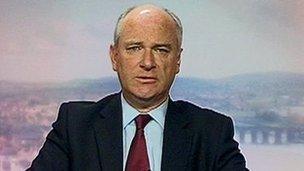Work Programme under fire as charities shut down
- Published

Charities think the scheme is a "walking disaster", says Sir Stuart Etherington
Several charities that have closed in recent months believe a government work scheme is partly to blame for their demise, a BBC investigation has found.
The Work Programme makes payments to organisations which help the long-term unemployed find a job.
But some charities said it had created severe cash flow problems for them.
The government said it was fair that charities were paid in full only after they had got people into work and kept them there.
Under the programme, contractors get a small fee when someone joins the scheme but they are only liable for larger fees once they have been in work for an extended period of time - of up to two years.
Eco-Actif Services, a small social enterprise in Sutton, Surrey, spent a year helping long-term unemployed people find work under the work programme.
When the organisation fell into financial difficulties, a High Street bank, a social enterprise investor and another charity all considered providing aid but the organisation's Work Programme contract discouraged any of them from investing.
"These organisations felt that the figures didn't add up in the longer term for the Work Programme as a whole," said former director Anna Burke.
Eco-Actif Services is one of at least four organisations that have closed recently, citing their Work Programme contracts as a major reason in their collapse. About 100 people have lost their jobs.
The BBC understands that another charity has written to the government to inform it that its Work Programme contract is causing it severe difficulties.
'Walking disaster'
In a survey released on Thursday by the National Council of Voluntary Organisations (NCVO), almost three quarters of respondents said their Work Programme contract was unsustainable. And nearly half said their contract could fail within six months.
"They think it's a walking disaster," said Sir Stuart Etherington, chief executive of the NCVO.
"I've heard no positive feedback from voluntary organisations. Some have gone bust, some have withdrawn from the programme. They have a real problem with the way the contracts are structured."
The programme is run on behalf of the government by 18 prime contractors, usually large private companies.
The charities are reliant on these companies to refer people to them. But those referrals have varied greatly from month to month, making financial planning impossible for some charities.
In addition, the BBC has discovered that those prime contractors are, in some cases, keeping up to half of the initial referral fee for themselves despite doing little work and passing the person - and the risk - on to the charities.
Liberal Democrat MP for North Devon Nick Harvey said: "It just isn't possible for small charitable organisation to wait months and months to be paid for something they've had to pay the costs for up front."
Mr Harvey was in government until last month's reshuffle and said that when he raised the problems the Work Programme was creating for charities with a fellow minister, they were not interested.
"They just said to me 'These small operators are naive to allow themselves to be stuck with these contractual arrangements,'" he said.
"But these aren't big businessmen, they are not doing it for the money. If they are offered a take-it-or-leave-it deal by some big PLC, frankly they haven't got much choice."
'Extraordinary situation'
It is not only charities that are struggling.
The local council in Barnsley is a Work Programme sub-contractor - but probably not for much longer, said council leader Steve Houghton.

Nick Harvey MP says his fellow ministers were not interested in the problems the charities faced
"We are simply not getting the numbers through on the Work Programme to make our contract viable, and it's getting to the point where we think we can no longer maintain that contract," he said.
Other organisations have already decided to pull out of the programme.
St Mungo's, the largest homelessness charity in London, withdrew in April. Not a single person was referred to them by the main contractors - a situation St Mungo's chief executive Charles Fraser finds incredible.
He said: "It's extraordinary. We have a well-respected track record in providing employment and training services to homeless people. It's inconceivable there was no demand for those services."
Mr Fraser said he believed the homeless were simply seen as being too difficult to help by the Work Programme.
"It's not because of homelessness; it's because other attributes are associated with it, such as long-term unemployment. I don't think the Work Programme has been very successful with the long-term unemployed."
The Department of Work and Pensions said financial arrangements between providers and their sub-contractors were a matter for them and no organisation should negotiate a deal they could not afford.
A spokeswoman for Work and Pensions Secretary Iain Duncan Smith said: "Payment by results is working. It is right and fair to the taxpayer that we only pay organisations that get people into work and keep them there, unlike the last government which paid out money to schemes upfront regardless of results.
"There are hundreds of organisations playing a part in the Work Programme, all working closely with us with the aim of making this a success and getting people into long term employment."
- Published29 March 2012
- Published1 March 2012
- Published3 February 2012